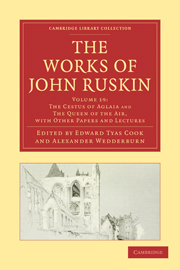Book contents
- Frontmatter
- Contents
- LIST OF ILLUSTRATIONS
- INTRODUCTION TO THIS VOLUME
- PART I “SIR JOSHUA AND HOLBEIN” (1860)
- PART II “THE STUDY OF ARCHITECTURE IN SCHOOLS” (1865)
- PART III “THE CESTUS OF AGLAIA” (1865, 1866)
- PART IV “THE RELATION OF NATIONAL ETHICS TO NATIONAL ARTS,” BEING THE REDE LECTURE FOR 1867
- PART V “ON THE PRESENT STATE OF MODERN ART, WITH REFERENCE TO THE ADVISABLE ARRANGEMENT OF A NATIONAL GALLERY” (1867)
- PART VI “FAIRY STORIES”: A PREFACE TO “GERMAN POPULAR STORIES” (1868)
- PART VII “THE FLAMBOYANT ARCHITECTURE OF THE VALLEY OF THE SOMME” (1869)
- PART VIII “THE QUEEN OF THE AIR” (1869)
- PART IX “VERONA, AND ITS RIVERS” (1870)
- APPENDIX: REPORTS OF ADDRESSES ON ART
- I ARCHITECTURE IN FRANCE (186l)
- II COMPETITION AND MECHANICAL ART (1865)
- III THE THREE-LEGGED STOOL OF ART (1868)
- Plate section
I - ARCHITECTURE IN FRANCE (186l)
Published online by Cambridge University Press: 05 November 2011
- Frontmatter
- Contents
- LIST OF ILLUSTRATIONS
- INTRODUCTION TO THIS VOLUME
- PART I “SIR JOSHUA AND HOLBEIN” (1860)
- PART II “THE STUDY OF ARCHITECTURE IN SCHOOLS” (1865)
- PART III “THE CESTUS OF AGLAIA” (1865, 1866)
- PART IV “THE RELATION OF NATIONAL ETHICS TO NATIONAL ARTS,” BEING THE REDE LECTURE FOR 1867
- PART V “ON THE PRESENT STATE OF MODERN ART, WITH REFERENCE TO THE ADVISABLE ARRANGEMENT OF A NATIONAL GALLERY” (1867)
- PART VI “FAIRY STORIES”: A PREFACE TO “GERMAN POPULAR STORIES” (1868)
- PART VII “THE FLAMBOYANT ARCHITECTURE OF THE VALLEY OF THE SOMME” (1869)
- PART VIII “THE QUEEN OF THE AIR” (1869)
- PART IX “VERONA, AND ITS RIVERS” (1870)
- APPENDIX: REPORTS OF ADDRESSES ON ART
- I ARCHITECTURE IN FRANCE (186l)
- II COMPETITION AND MECHANICAL ART (1865)
- III THE THREE-LEGGED STOOL OF ART (1868)
- Plate section
Summary
1. Mr. J. Ruskin, having been called upon by the Chairman, said he should hardly venture to accept the invitation to address the meeting; for almost every member of the Society knew better than he did what was going on, both in France and England; many of them from personal knowledge, and some from professional engagements. He felt the difficulty all architects and other persons were placed in who had any connection with the restoration of ancient buildings. They ought not to throw stones at anybody, but what they should do was to suggest what should be done to ancient buildings under the most difficult circumstances. He himself for long had been utterly hopeless respecting the state of architecture in France—hopeless, especially because he felt that the line taken there was, that what was determined by the leading public men there would be carried out, and that any suggestion which might be made to those engaged in that course was likely to wound their vanity, and was likely to come ungracefully from us, who had not altogether shown ourselves prudent, or sufficiently cautious, perhaps, in the restorations we had undertaken at home.
2. He felt it was a great difficulty to interfere, and one great difficulty was the weakness of the French, which he supposed they would confess to themselves, which all nations shared with them—but which, perhaps, they would admit they possessed at all events, and which frequently led them to nobleness of action, as at Magenta and Solferino—he meant national vanity. So it might be in reference to the restoration of French architecture.
- Type
- Chapter
- Information
- The Works of John Ruskin , pp. 461 - 464Publisher: Cambridge University PressPrint publication year: 2010First published in: 1905

